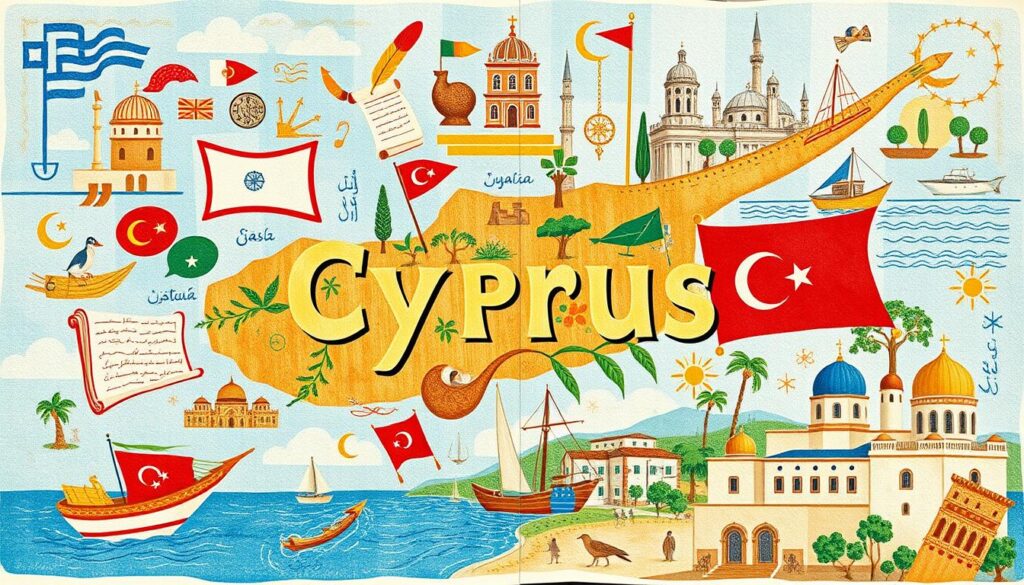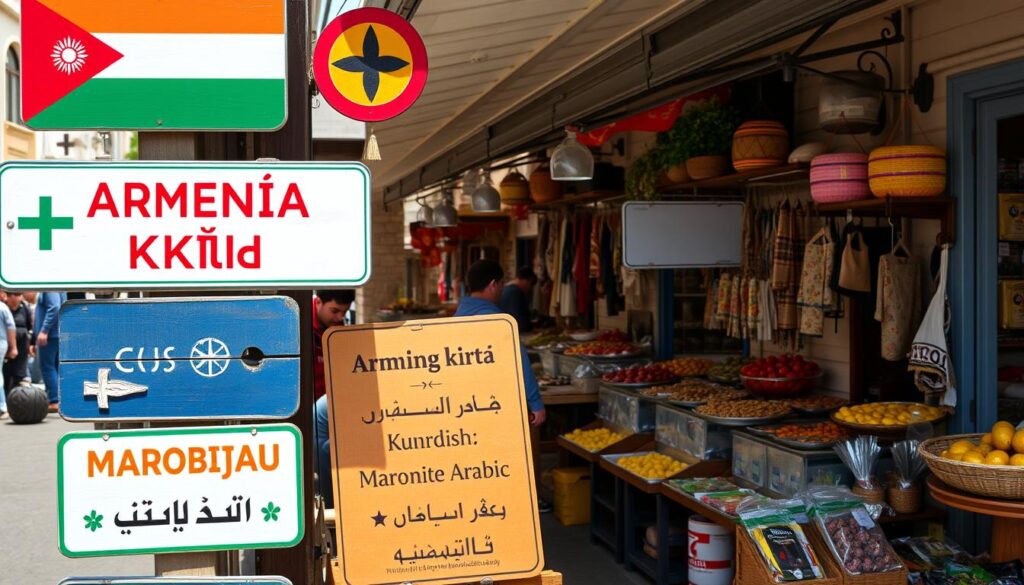The Republic of Cyprus is a vibrant landscape of languages, showcasing a rich linguistic tapestry emblematic of its multifaceted history and cultural influences. The official languages in Cyprus are Greek and Turkish, reflecting the linguistic landscape primarily shaped by the Greek Cypriot majority and the Turkish Cypriot minority. Additionally, English, a remnant of the British colonial period, is widely spoken, resulting in a multilingual society where many Cypriots navigate between various languages in their daily lives. This fascinating language diversity in Cyprus highlights the cultural depth of the island and provides insights into the intricate dynamics of its communities. To learn more, visit the full article on the languages of Cyprus.
Key Takeaways
- Cyprus features a complex linguistic environment with Greek and Turkish as its official languages.
- English is widely spoken, making Cyprus a multilingual society.
- Approximately 700,000 native speakers of Cypriot Greek were recorded in 20111.
- The population of Cyprus is estimated to be 1,336,000 as of 20242.
- Illiteracy remains extremely low due to a robust educational system.
Unlock Investment Opportunities Abroad!
Overview of Language Diversity in Cyprus
The island of Cyprus showcases rich language diversity in Cyprus, heavily influenced by its historical context and changing demographics. Greek is the predominant language, spoken by approximately 80.9% of the population, while Turkish is spoken by about 20%3. The sociolinguistic fabric of the island fosters bilingualism in Cyprus with many residents conversing in several languages, including English, which is widely used as a second language. The influence of English stems from Cyprus’s historical ties to Britain, contributing a significant layer to the languages spoken in Cyprus4.
In addition to Greek and Turkish, a variety of other languages such as Russian, German, and French can be heard across the island, reflecting the multicultural environment3. The 2011 census revealed that while Greek dominates, English accounts for roughly 4.1% of speakers, indicating its role as a crucial language for communication among diverse ethnic groups4. This linguistic mix illustrates the vibrant culture of Cyprus, where external influences blend seamlessly with traditional customs.

As a strategic crossroads between Europe, Asia, and Africa, the linguistic landscape of Cyprus continues to evolve, fostering a unique appreciation for both native and foreign languages. Each community maintains its rich traditions while actively participating in a shared linguistic experience, reinforcing the island’s distinct character.
The Official Languages of Cyprus
In Cyprus, the official languages are the Greek language and the Turkish language, as established by the constitution. This bilingualism reflects the cultural richness and complexity of the island. Around 80.9% of the population communicates in the Greek language, primarily in its Cypriot form. The Cypriot dialect maintains a connection to ancient and medieval Greek, offering one of the most authentic representations of the language today5. Furthermore, the Greek language’s evolution has been shaped by extensive historical influences, which have introduced various phonetic characteristics, including unique sounds and pronunciation variations5.
Greek Language
The Greek language has deep historical roots, having replaced the previous written language in Cyprus during the 4th century BC5. There are notable influences from various conquering powers, notably the Venetians and Ottomans, which have contributed to the local vocabulary. Many Cypriots find learning Greek challenging, while Russian speakers often perceive it as relatively easier due to grammatical similarities5.
Turkish Language
The Turkish language serves the Turkish Cypriot community, and its use reflects a blend of Ottoman heritage and local dialects. Turkish has significant regional variations, influenced by dialects such as the Yörük. The importance of both the Greek and Turkish languages in Cyprus highlights the identity and unity of the island’s diverse communities. An interesting point is that about 80.4% of the Cypriot population is proficient in English, making it the most popular foreign language in the country6.

What Language is Spoken in Cyprus
The linguistic landscape of Cyprus is rich and diverse, primarily dominated by Greek and Turkish, which serve as the official state languages of the island7. The majority of Greek Cypriots communicate in Greek, and a local variation known as Cypriot dialect is prevalent, differing from Classic Attic Greek7. In addition to these languages, English holds a significant place in Cypriot society, with approximately 80.4% of the population using it as a second language6. English has been a part of the language mix since British rule, where it was the sole official language6 and remains widely utilized in education, business, and tourism8.
Furthermore, Cyprus has seen an influx of Russian-speaking individuals, with about 50,000 residing on the island, particularly in Limassol, which has earned the nickname “Russian capital of Cyprus”7. The rise in Russian speakers is attributed to tourism and a growing expatriate community6. Many services cater to this demographic, offering support in Russian, including signage and personnel fluent in the language7.
Cypress’s multilingual environment reflects the interconnectedness of its people amid various cultural influences. Besides the major languages, French is spoken by 12% of the population, while 5% speak German, enhancing the country’s vibrant tapestry of vernacular languages6.
Vernacular Languages: Cypriot Greek and Cypriot Turkish
The vernacular languages in Cyprus reveal a fascinating tapestry of linguistic heritage, notably embodied in Cypriot Greek and Cypriot Turkish. These dialects carry distinct characteristics that reflect the island’s rich cultural history.
Characteristics of Cypriot Greek
Cypriot Greek represents the colloquial form of Greek unique to the Greek Cypriot population. It showcases specific phonological, morphological, and lexical traits that differentiate it from Standard Modern Greek. The vernacular has deep roots, influenced heavily by Byzantine traditions and the evolving linguistic environment across Cypriot history. Recent integration of Pontic Greek speakers in the Karpasia peninsula adds to the complexities of this dialect, demonstrating a blend of linguistic influences amidst historical migrations9.
Understanding Cypriot Turkish
Conversely, Cypriot Turkish, primarily spoken by Turkish Cypriots, merges features from Ottoman Turkish with local dialects, along with elements borrowed from Greek. As of 2016, around 300,000 native Turkish speakers, encompassing various Turkish dialects, were noted in Northern Cyprus10. In the south, there were approximately 1,400 Cypriot Turkish speakers documented in 201310. Despite this presence, Cypriot Turkish is not officially recognized in the north, where modern standard Turkish became the dominant language in education and media following the 1974 invasion10. This dynamic illustrates the rich cultural exchange between Greek and Turkish speakers on the island.

Unlock Investment Opportunities Abroad!
Minority Languages in Cyprus
Cyprus is home to a range of minority languages that enrich its cultural landscape. Two of the notable minority languages in Cyprus are the Armenian language and Cypriot Arabic. They are part of the island’s diverse linguistic tapestry, which encompasses a variety of dialects and languages.
Armenian Language
The Armenian language is spoken by a small but vibrant community in Cyprus, comprising around 3,000 speakers. Many of these individuals are bilingual, fluent in both Armenian and Greek, showcasing the integration of the Armenian community within the broader Cypriot society11. This community has roots on the island that extend back to the sixth century. The language itself acts as a vessel for preserving cultural traditions and history, contributing immensely to the rich amalgamation of languages present in Cyprus.
Cypriot Arabic
Cypriot Arabic, also known as Maronite Arabic, is another minority language spoken on the island. This language is primarily used by the Maronite community, which faces the challenge of declining usage, with only a few hundred speakers remaining1211. The origins of Cypriot Arabic trace back to migrations from the Levant, reflecting the historical links between Cyprus and the broader Arab world. As an endangered language, it plays a vital role in the cultural identity of the Maronite people, encapsulating their heritage and traditions.

Historical Influences on Cypriot Languages
The island of Cyprus has a long and intricate history that has greatly influenced its linguistic landscape. The earliest evidence of human habitation on the island dates back 11,000 years. The arrival of people from Cilicia around 6000 B.C. marked the beginning of various cultural interactions that would shape the languages spoken on the island13. The 16th century B.C. saw pottery from mainland Greece introduced, further intertwining the Greek language with Cypriot culture13.
Subsequent centuries were marked by significant events, such as the continuous Mycenaean colonization from 1200 to 1050 B.C., which laid down linguistic roots13. The emergence of the Cypriot syllabary at the end of the second millennium B.C. provided a framework for recording the Cypriot Greek dialect and Eteo-Cypriot13. This pre-Greek language existed until the 4th century B.C., showcasing a rich linguistic tapestry that evolved over centuries13.
The historical influences on Cypriot languages are reflected in the demographics of the island today. The Greek Cypriot community comprises 77% of the population, while Turkish Cypriots represent about 18%14. Cyprus’ colonial past under British rule from 1878 to 1960 introduced English as a major language, particularly in business, tourism, and education14.
The linguistic diversity in Cyprus includes a mixture of dialects and languages. Cypriot Greek, which belongs to the South-Eastern dialects, emerged with the first Greeks who settled the island after the destruction of the Mycenaean palaces15. Its distinct phonological features differentiate it from Standard Modern Greek15. Furthermore, the presence of minority communities, such as Armenians and Maronites, enriches the cultural and linguistic variety of Cyprus14.
The island’s complex historical influences contribute to ongoing language evolution in Cyprus. As different ethnicities and cultures have interacted and blended over centuries, this has led to a vibrant and dynamic linguistic environment that continues to evolve today. The connections among languages highlight the interwoven fabric of Cypriot identity, shaped by a multitude of influences.
| Influence | Date/Period | Details |
|---|---|---|
| Arrival of Cilicians | 6000 B.C. | Initial cultural interactions leading to language exchange. |
| Mycenaean Colonization | 1200 – 1050 B.C. | Continuous settlement introducing Greek language elements. |
| Emergence of Cypriot Syllabary | End of 2nd Millennium B.C. | Writing system for Cypriot Greek and Eteo-Cypriot. |
| British Colonial Rule | 1878 – 1960 | Introduction of English as a dominant language in administration and education. |
| Current Linguistic Landscape | Present | 77% Greek Cypriots, 18% Turkish Cypriots enriching linguistic diversity. |
Conclusion
The languages of Cyprus present a fascinating tapestry reflecting the island’s cultural diversity and complex history. With a population estimate of 1,336,000 in 2024, the linguistic landscape represents various groups, each contributing to the richness of the Cypriot identity16. The coexistence of Greek and Turkish as official languages is prevalent, with around 76% of the southern population able to communicate in English, showcasing another layer of cultural diversity in Cyprus11.
In addition to these official languages, minority languages such as Armenian and Cypriot Arabic enhance the unique language environment. The small community of Armenian Cypriots, for instance, numbers around 3,000 and is often bilingual in Greek and Armenian11. This dynamic multilingualism not only fosters opportunities for intercultural exchange but also presents challenges as various ethnicities navigate their identities within this vibrant society.
Ultimately, understanding the languages of Cyprus is crucial for appreciating its profound cultural diversity and addressing the sociolinguistic challenges that arise. As Cyprus continues to evolve, its linguistic landscape will remain a significant factor in shaping future interactions across communities16.
Unlock Investment Opportunities Abroad!
FAQ
What are the official languages in Cyprus?
The official languages in Cyprus are Greek and Turkish, reflecting the island’s Greek Cypriot majority and Turkish Cypriot minority.
Is English spoken in Cyprus?
Yes, English is widely spoken in Cyprus and serves as a secondary language due to the country’s historical ties to British colonial rule. It is commonly used in education, business, and daily interactions.
What is the significance of Cypriot Greek and Cypriot Turkish?
Cypriot Greek and Cypriot Turkish are vernacular languages distinct from Standard Greek and Turkish. They reflect local dialects and cultural nuances, often used in everyday conversation by Cypriots.
Are there minority languages in Cyprus?
Yes, minority languages in Cyprus include Armenian and Cypriot Arabic, both of which contribute to the island’s linguistic diversity.
How does bilingualism manifest in Cyprus?
Many Cypriots are bilingual, often switching between Greek, Turkish, and English in their daily lives, illustrating the multilingual character of the society.
What influences the language diversity in Cyprus?
The language diversity in Cyprus is influenced by its complex history, colonization, and demographic changes, resulting in a rich tapestry of languages and dialects.
Why is it important to understand the languages of Cyprus?
Understanding the languages of Cyprus is crucial for appreciating the island’s cultural diversity, recognizing the challenges and opportunities within its multifaceted linguistic landscape.
Source Links
- https://en.wikipedia.org/wiki/Cypriot_Greek
- https://www.britannica.com/place/Cyprus/People
- https://cyprusnext.com/language/
- https://www.cia.gov/the-world-factbook/countries/cyprus/summaries
- https://www.dutchtrans.co.uk/what-language-is-spoken-in-cyprus/
- https://www.familysearch.org/en/wiki/Cyprus_Languages
- https://dom.com.cy/en/live/blog/the-language-of-cyprus/
- https://www.educations.com/study-guides/europe/studying-in-cyprus/language-20080
- https://www.mdpi.com/2226-471X/7/4/253
- https://en.wikipedia.org/wiki/Cypriot_Turkish
- https://www.estateprovidentia.com/en/what-language-is-spoken-in-cyprus/
- https://skrivanek.pl/en/cyprus-language/
- http://www.palaeolexicon.com/Cypriot
- https://www.hotbot.com/answers/what-language-is-spoken-in-cyprus
- https://www.persee.fr/doc/rbph_0035-0818_2012_num_90_3_8270
- https://www.britannica.com/place/Cyprus

Comments